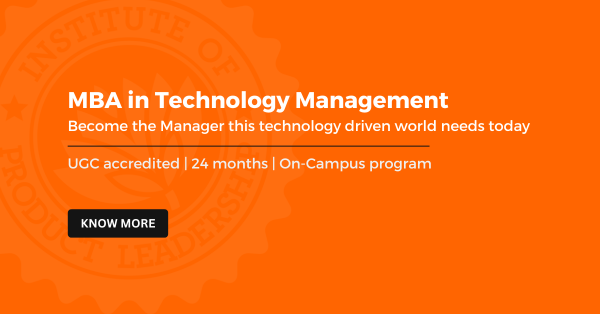Why Every Professional Should Consider a Full-Time MBA
- Career
- 4 min read
In 2023, nearly 43% of MBA applicants had more than three years of work experience, according to GMAC. Since then, that figure has increased further. Why? Increasing numbers of professionals understand that experience alone doesn’t help them compete in the business world today. You could be doing your job really well and seeing your salary go up regularly. But we’re sure that at some point you’ve started to question – Is this the best life can get?
That nagging question, that itch to grow beyond your current role, to lead instead of follow, to shift lanes or build something of your own- that’s where a full-time MBA comes in. If you keep asking yourself, “What’s next?” then it’s time to consider a full-time MBA. Not only is it a major qualification, but it acts as a strong start-over. An opportunity to stop, think and reset. More people are trading their 9-to-5s for studying in business schools. Find out why and decide if it suits you.
Key Takeaways:
- A full-time MBA offers early-career professionals a structured, high-impact way to pivot or accelerate their careers.
- It provides exposure to real business problems, diverse teams, and decision-making under pressure.
- Timing matters; 1 to 6 years of experience is usually ideal for maximum return.
- Long-term payoffs include better roles, leadership credibility, and lifelong adaptability.
- Earning an MBA is not only about finishing a degree program; it’s about professionals who hope to take on bigger roles.
Suggested Read: MBA vs MTech: Which One Should You Choose After BTech?
What Is a Full-Time MBA and Who Is It For?
A regular MBA program lasts for two years and equips working professionals to become future leaders. It requires focus, is fast-paced and isn’t limited to just learning from books. It’s not just about marketing, finance or strategy – you also work cooperatively to solve business issues, pitch your ideas to investors and handle stress much like in a boardroom.
Who is it for?
- Early-career professionals who are starting their career path and want to try something new or move to a new profession.
- Engineers and technical workers who want to become involved in product, strategy or management.
- Anyone looking to learn business skills before starting something on their own.
- Corporate professionals aiming for CXO roles where cross-functional knowledge and leadership are must-haves.
So, if you’ve been in the workforce for a few years and are feeling a mix of growth, confusion, ambition, and burnout, it’s probably for you.
Why an MBA for Professionals Makes Strategic Sense
Why don’t we approach this honestly? Nowadays, it takes something more than loyalty and dedication to make progress. Everyone in businesses wants to hire individuals who think, build and lead, not simply follow. Full-time MBA programs give professionals several big advantages.
1. Career Reset with Clarity
If you want to change your industry (for example, tech to consulting) or switch from finance to product, the MBA provides you with time and guidance to make a considered change.
2. Learn How Businesses Actually Work
No matter how strong you are in your own limited space, the MBA opens your perspective. You’ll see how marketing influences finance, how the flow of products affects customers and why leadership is more than holding a management position.
3. Your Network Gets an Upgrade
You’re not just learning how to become an entrepreneur, you’re making relationships with others who can play key roles later in your career. Even after you graduate, the network is still there for you.
4. Access to Roles You Couldn’t Reach Before
Strong preference for MBA graduates can be found in many top positions in strategy, product or consulting. The reason is not only a choice, it’s about how MBAs think and what they can do.
5. Personal Growth That Goes Beyond Career
You learn to solve problems fast, work with many kinds of individuals, listen to advice, direct talks and explain your choices. Developing that way on the job is not easy
When Is the Right Time to Pursue a Full-Time MBA?
This is the question that causes most difficulty for professionals. You’re making good money and probably have things to handle, so quitting your job for two years can be pretty scary. Yet timing plays a key role and here’s how to think about it:
1. You have 1–6 years of experience
You’ve likely found a balance. You have experience in how work really works, even though you’re willing to explore alternative paths.
2. You’re hitting a growth plateau
Once promotions aren’t as interesting and nothing new is happening for you, it’s time to leave. Don’t let it get to the stage where you are working yourself to the edge.
3. You want to shift industries or functions
If your goal is to move from backend development to product management or operating your company to venture capital, an MBA helps.
4. You want to start something on your own
Business schools today do much more than only teach using case studies. A lot of universities make incubators, entrepreneurship areas and financial support available to students.
5. You feel under-equipped for leadership roles
Being charged with leading a team and being a strategic leader are not the same. MBAs help you improve your executive presence, learn to share stories and think about how things are linked.
How a Full-Time MBA Pays Off in the Long Run
People often ask – Is it worth the money? Fair question. Here’s the honest answer: not overnight. But over 5, 10, 20 years? Absolutely.
1. Better Roles with Higher Pay
People with MBA degrees are attractive to top recruiters for other reasons, too. They recruit people because they believe these grads are able to find solutions, take charge and produce results. It leads to quicker promotion in your career and increased compensation.
2. Long-Term Career Growth
A full-time MBA doesn’t just support you in acquiring new employment. You develop the skills to face significant changes, such as becoming a CPO, founding a startup or entering the social impact field, after graduation.
3. Brand Equity and Credibility
When you graduate from a famous business school, people consider your degree to matter. Either when aiming for global careers or looking for investment from investors, having that recognition helps you stand out.
4. Ability to Reinvent Yourself
Business change and work environments shift, yet MBAs are meant to respond to new challenges. Thanks to that resilience, people benefit when AI, automation and new economic forces begin to shape our lives.
For those of you merging from a tech or product background, the MBA in Technology Management by the Institute of Product Leadership will catch your eye. Unlike other MBAs that focus on theory, this one is catered to practitioners in product, design, data, and tech. With a strong focus on industry projects, mentorship in actual workplaces, and innovation leadership MBA programs, it’s helpful if you want to advance in digital-centric companies. This is not about changing careers; it is about speeding up the career you already have.
Suggested Read: Which MBA Specialization Is Best for Engineers?
A full-time MBA isn’t just for fresh grads or those chasing fat paychecks. It’s a real investment in yourself. One that takes courage, clarity, and a bit of chaos. But the returns? They show up in confidence, clarity, and doors that wouldn’t have opened otherwise.
So if you’re sitting at your desk, wondering whether this is all there is, maybe it’s time to step away, reboot, and come back stronger.
Your career isn’t just a ladder. It’s a playground. And the MBA? That’s your new set of tools.
Frequently Asked Questions (FAQs)
A full-time MBA is a two-year immersive program that gives students comprehensive business training, with access to core courses, electives, training through internships and many networking opportunities.
Yes, for professionals aiming to pivot careers, enhance leadership skills, or accelerate growth, an MBA can provide valuable knowledge, networks, and credentials.
Students are usually required to have 2-5 years of experience in the workplace, but the experience needed may not be the same at all schools.
Key benefits include career advancement, skill development, expanded professional networks, and increased earning potential.
An MBA in Technology Management gives professionals the skills to combine strategies with their knowledge of technology for management in tech industries.






